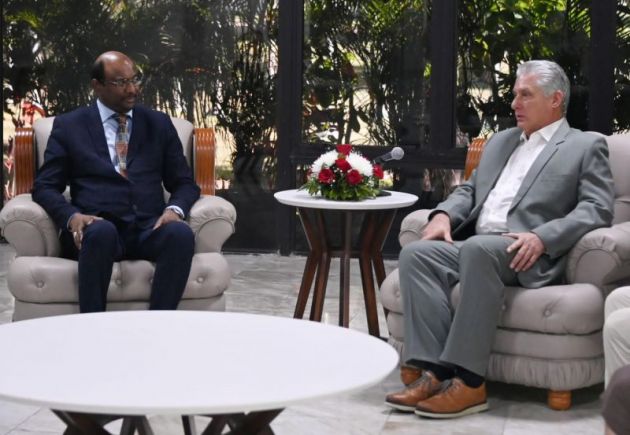World Council of Churches head meets with Cuban president in Havana

The World Council of Churches general secretary Rev. Jerry Pillay has met with Cuban president Miguel Díaz-Canel at the Palacio de las Convenciones in Havana.
"I was deeply impressed with our heart-to-heart meeting with the president of Cuba," said WCC head Pillay, during a visit to Cuba from Dec. 17-19.
The WCC said Pillay stressed the WCC's ongoing support for Cuban people and churches.
He reiterated the WCC's stance against the commercial and financial blockade against Cuba by the United States.
The meeting ended with Díaz Canel requesting Pillay, who is from South Africa, to pray for him and the people of Cuba.
"The WCC 11th Assembly called for the removal of Cuba from the list of countries that sponsor terrorism," said Pillay, who is with Uniting Presbyterian Church in Southern Africa..
"We at the WCC will continue to accompany the churches as prophetic voices of peace, hope, cooperation, and mutual respect."
FIRST VISIT TO CUBA
Pillay, in his first visit to Cuba as WCC general secretary, also expressed appreciation for religious freedom in Cuba.
He cited a meeting with Cuban foreign affairs minister Bruno Rodríguez Parrilla to talk about the positive relationships between the WCC and religious organizations in Cuba.
"We met with our member church, the Presbyterian Church in Cuba and a large number of other churches that are part of the Cuban Council of Churches," said Pillay.
"I saw a huge statue of the Christ overlooking the city which is most unusual in a place accused of restricting religious freedom. The churches in Cuba confirmed their freedom to worship and exercise their faith and beliefs."
The U.S. State Department, however says in its 2022 Report on International Religious Freedom in Cuba, that ins its annual Watch List, the Christian nongovernmental organization (NGO) Open Doors reported the Cuban government intensified its repressive tactics against Christian leaders and activists opposing CCP ideology.
It did this through arrests, exile, arbitrary fines, surveillance, denials of licenses and religious visas, and physical and mental abuse.
According to CSW, formerly known as Christian Solidarity Worldwide, the government continued to detain religious leaders from multiple faith communities and handed down harsh prison sentences for participating in July 2021 protests.
A law in force since 2019 curtails freedom of expression on the internet to protect against "disseminating information contrary to the common good, morals, decency, and integrity through public data transmission networks," said the U.S report.
The penalty for violating the law is 3,000 Cuban pesos ($130) or two to four years in prison.
And a law in effect since Dec. 1 imposes sentences of up to 10 years' imprisonment on those receiving funding from foreign organizations, including religious groups, or financing activities the government considers to be directed against the state or its constitutional order.
The U.S. State department said that religious education is highly regulated, and homeschooling is illegal, with parents who homeschool their children subject to arrest. The amended family code states that parents have the responsibility to instill in children love for the homeland, respect for its symbols, and respect for government authorities.
Earlier in the week, Pillay gave a sermon at the Presbyterian Reformed Church of Cuba, which is the first Protestant church in Havana, and a founding church of the Cuban Council of Churches. He also delivered a lecture at Havana University.
